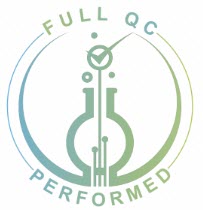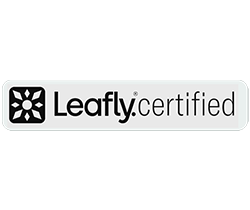Hemp-derived CBD products have therapeutic benefits for many. Whether for medical or recreational use, users have a right to know exactly what they’re getting. Testing with an accredited third-party laboratory like Modern Canna establishes supplier credibility and instills consumer trust.
Modern Canna is proud to be the only certified Leafly partner in Florida. We only work with hemp companies that take their respective industries seriously and aim to build sustainable businesses. Modern Canna utilizes the latest methodology and industry-leading technology to ensure only the safest hemp CBD products reach consumers. We offer a full range of testing services geared towards analyzing hemp and hemp-derived samples for contaminants.
Hemp Testing: What we are testing for?
Federal legislation legalized hemp commercial production in 2018, enabling hemp to be produced commercially nationwide. There is a caveat, however; hemp material cannot exceed 0.3% THC concentrations. Products that are released without testing are at risk of serious legal liability for hemp cultivators and processors. The risk extends beyond THC concentrations.
At Modern Canna, we test for cannabinoids like CBD and THC, as well as the following:
- Terpenes – There are an estimated 200 terpenes found in hemp. We test for the most common terpenes, which are essential for the hemp’s aroma and botanical effects.
- Residual solvents – Solvents are needed to extract cannabinoids from the raw plant. However, residual solvents left behind include contaminants like butane and propane, just to name a few.
- Moisture content – We use a drying method or moisture balance instrument to test for a hemp sample’s water weight.
- Heavy metals – Heavy metals can pass onto the hemp from contaminated soil/water or hardware, such as vape pens. Modern Canna tests for harmful metals like arsenic, lead, mercury, cadmium, chromium, etc.
- Microbial impurities – Detecting and identifying harmful microbial content. This includes those found in the raw plant, such as mold, yeast, aspergillus, and E. Coli.
- Pesticides – Pesticides are a part of hemp cultivation, just as with any other crops. We test for pesticide residue that includes insecticides, fungicides, and plant growth regulators.
- Water activity – This is not to be confused with moisture content. Water activity testing assesses moisture levels on the plant’s surface, which cannot surpass certain concentrations. Excess moisture elevates the risk of microbial growth.
How the Hemp Testing Process Works
- Find a good laboratory – Find a laboratory that is not only ISO/IEC-17025 certified but also shows proof of how they validate their data.
- Complete a Chain of Custody (COC) form – The COC is used for sample submission and helps the laboratory keep track of the entire hemp testing process. This form contains information pertaining to sample material, sample weight, analyses required, and sample collection date and time. The COC also keeps track of each entity handling hemp materials, from sample collection to transportation, to the time lab results are reported.
- Sample transportation – Coordinate with the laboratory on whether to ship samples or request a courier.
- Waiting for results – This is where the lab takes over. The hemp lab testing process includes:
- Once the samples arrive at the lab they get logged into the laboratory information management system (LIMS).
- Samples are then prepped. Sample preparation is tedious and requires skilled analysts and a sound methodology. Some examples of sample preparation are weighing, grinding, pulverizing, flash-freezing, diluting, extracting, digesting, sonicating, and filtering.
- Once the samples are prepped they are run on an instrument specific to the analysis required. Sample run times vary depending on the analysis required.
- After samples are run the data is reviewed and thoroughly evaluated by the lead analysts and lab managers.
- Lastly the data is converted into full report and certificate of analysis (COA) formats and then sent to the clients.
How to Read a Hemp COA
Responsible consumer due diligence requires reviewing a hemp certificate of analysis (COA) before purchasing or taking CBD products. One of the first things you will notice on most COA’s is a list of the cannabinoids detected along with their concentration. Under the ID column, you can read which cannabinoids were tested for D9-THC. To be legal, this number must be lower than .3 percent. If under the Weight % column, you see “ND,” this stands for Non-Detect, meaning the amount of D9-THC is so small as to be virtually undetectable by the lab.
Understanding Hemp COA acronyms
Some other acronyms you will find on a COA include “LOQ” or “limit of quantification”, “RPD” or “relative percent difference”, “MDL” or “method detection limit”, and “PQL” or “practical quantitation limit”. Compare the results of your COA to the allowable limits or maximum amounts as outlined by your state regulators. If contaminants such as pesticides, heavy metals, mycotoxins, or residual solvents were analyzed, check the COA to make sure they received a "PASS". This indicates the amount tested fell within the legal limits. A “FAIL” determination suggests otherwise.

Is ISO/IEC 17025 accreditation sufficient?
Modern Canna recognizes the importance of quality, accuracy, and integrity in hemp testing. A laboratory with ISO/IEC 17025 accreditation such as ours has validated the methodology and is able to generate accurate results at an internationally accepted level. ISO/IEC 17025 accreditation doesn't guarantee that a lab is trustworthy. There is a reason why Modern Canna was selected as one of the first initial labs in the United States for Leafly’s certified lab program. We provide timely, comprehensive, and accurate testing to ensure hemp products are safe and meet the most stringent regulations.
The hemp industry has been plagued by inaccurate third-party testing for several years. While it continues to improve as the industry evolves, data manipulation still exists. This is where labs inflate potency numbers to appease hemp cultivators or CBD product manufacturers. Whether it’s inflating potency numbers or deeming unsafe products safe for human consumption, these labs continue to give the industry a tarnished reputation. By cutting corners and deceiving consumers, these labs risk losing their certifications. Eventually, regulations will tighten, the industry will evolve, and they will disappear.
Do your due diligence. Contact the producer and ask them to provide you with the quality control report that supports the COA in question. Remember, the COA is a summary report. A reliable third-party laboratory should always issue quality control data with every batch they test. Quality control ensures that the laboratory is following proper protocols and producing verifiable results. Good labs and producers are transparent and happy to provide this information. For more on this see our Quality Control page.
Entrust Hemp Testing to Modern Canna
Several of the largest hemp producers in the nation turn to Modern Canna for third-party lab testing. This is not a coincidence. Given the amount of effort we put into continuously improving our lab efficiency. Contact us today to learn why hemp cultivators nationwide rely on us.


